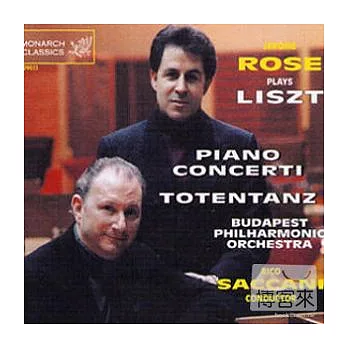客服公告:反詐騙!不碰ATM、網銀、不說信用卡,認證藍勾勾FB粉絲頁詳情
客服公告:反詐騙!不碰ATM、網銀、不說信用卡,認證藍勾勾FB粉絲頁詳情

★樂評家Steven J. Haller:簡單的說,這是示範級的演奏。--美國唱片指南,2003年7/8月號 (Medici/Lins)
曲目
1-4. 李斯特:降E大調第一號鋼琴協奏曲S124
5-10. 李斯特:A大調第二號鋼琴協奏曲S125
11-20. 李斯特:死之舞Totentanz S126
鋼琴:傑若米‧羅斯Jerome Rose
塞坎尼Rico Saccani指揮布達佩斯愛樂
Budapest Philharmonic Orchestra
錄音:1993年
重發:2003年
原始發行:VOX
★樂評全文:
American Record Guide
July-August, 2003
by Steven J. Haller
This isn’t new; it was recorded in 1993 and is listed in my seven-year-old Schwann as a Vox set coupled with the Transcendental Etudes (reviewed below). Jerome Rose has now started up his own label, Monarch Records(註:現更名為Medici Classics)and there’s even a website where these recordings and others may be found. I’m sorry it took so long for me to make their acquaintance.
Certainly this is a much better account than the Artisie with Norman Krieger reviewed a couple issues back, though his Totentanz at least offers Rose some competition. Opening with the familiar Dies Irae plainchant in the stentorian horns, Rose at once compels attention with his command of the slashing chords and crisp glissandos, then settles down for a poetic statement of the theme in more lyrical guise. Through all the shifting moods that follow, Rose demonstrates an admirable flexibility and consummate skill, expertly fielding the trenchant diablerie. Yet I was most impressed with his deeply felt treatment of the pensive Variation 4, just as his whirlwind account of the ensuing fugue had me on the edge of my seat. All through the piece it is clear that conductor Saccani was of one mind with Rose, and I am pleased that for once Variation 6 resounding in the horns was not dragged out interminably, setting up the powerful closeout.
Likewise in the E-flat Concerto Rose gives a commanding account of the opening pages, with due respect to the maestoso marking, as sonorous as you could wish; yet phrasing seems quite ex tern pore just as it surely was with Liszt. In fact, I found it rather refreshing that even in a standard like this you could never be sure how he’d play out the next phrase--yet it is always at the service of the music, an illuminating treatment of the solo line. In the quasi adagio section, Rose is deeply affecting, allowing the music to unfold in timeless fashion; indeed, I could imagine Liszt at the keyboard, lost in thought and no doubt gently swaying from side to side. Rose nimbly traverses the fanciful allegretto vivace, yet exhibits an enchanting delicacy, bringing out the humor of the piece as if with tongue in cheek, with the aid of the insistent triangle. But it’s clear from the return of the opening statement and the closing allegro marziale animato that Rose is not concerned merely with effect, even in this music that fairly cries out for such treatment; there’s fire and flash aplenty, but there is weight as well, though even Rose can’t resist that last sprint to the final bar.
The A-major Concerto is a far more reflective work that calls for a certain restraint, and the unhurried opening pages set the pace. Rose enters gently, reverently, yet without ever losing sight of the long line, soon joining with the solo cello in a rapt colloquy. As the music gathers in strength, Rose gives it the grand treatment, building to the bold and brassy climax some six minutes in. Yet clearly for Rose the emotional center of the concerto is the tempo del andante that follows, deeply felt and satisfying. With the return of the full orchestra (allegro deciso) the Budapest trombones go all out; and following a gratefully lyrical reading of the songful un poco meno mosso, Rose and the Hungarian players join forces for an effective close.
Given that the recording dates back some years, a trace of hardness in louder passages may be forgiven; and although the top end of the piano can be a mite clattery (as in the opening glissandos of Totentanz), the deep bass more than compensates. This is not a airing of the Liszt concertos that explores hidden meanings in every phrase like Richter or goes all out for visceral excitement like Janis; these are quite simply exemplary performances at a low cost that will make a splendid introduction to the music, and the excellent notes by Richard Freed are almost worth the price of admission.
關於各式音樂播放規格,請見【Q&A音樂播放規格說明】。
使用電腦播放程式請留意:CD曲目的編排是否正確,將視您所使用之播放程式其串連的媒體資料庫所提供的資訊而定。若播放程式所顯示的專輯資訊內容與實際商品有出入,此非商品本身問題,請您可手動更新程式或向程式管理人員反應。
「限量商品購買提醒:因數量有限,若庫存不足時,將無法提供換貨,敬請包涵見諒。」
退換貨說明
請注意!下列商品購買後博客來不提供10天的猶豫期,請務必詳閱商品說明並再次確認確有購買該項商品之需求及意願時始下單購買,有任何疑問並請先聯繫博客來客服詢問:
1.易於腐敗、保存期限較短或解約時即將逾期。
2.客製化之商品。
3.報紙、期刊或雜誌。
4.經消費者拆封之影音商品或電腦軟體。
5.下載版軟體、資訊及電子書。
6.涉及個人衛生,並經消費者拆封之商品,如:內衣褲、刮鬍刀…等。
7.藝文展覽票券、藝文表演票券。
非屬上列品項之商品均享有到貨十天的猶豫期﹝含例假日﹞。退回之商品必須於猶豫期內寄回。
辦理退換貨時,商品必須是全新狀態與完整包裝(請注意保持商品本體、配件、贈品、保證書、原廠包裝及所有附隨文件或資料的完整性,切勿缺漏任何配件或損毀原廠外盒)。退回商品無法回復原狀者,恐將影響退貨權益或需負擔部分費用。
訂購本商品前請務必詳閱商品退換貨原則。